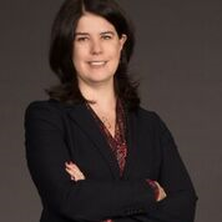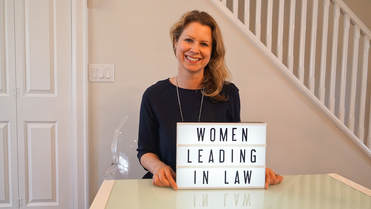 The next amazing woman to be profiled in this Women Leading in Law series is Kathryn Manning, one of the the founding partners of the new litigation boutique DMG Advocates LLP located in Toronto. I first met Kate through mutual acquaintances but we also seem to be on the same networking circuit and often run into each other at several legal events throughout the year. Kate's story resonates with me, not only because we both started our legal careers at McMillan Binch, but because we both quit good jobs to take a risk and start something of our own. Being your own boss can be quite empowering, and the more women we have in power, I believe, the more likely positive changes can be made to our profession. I hope you enjoy Kate's story and her spot-on advice for other lawyers. 1. Tell me a little about your practice or business: I am a partner in a boutique litigation firm – DMG Advocates LLP. My two partners and I all have expertise in commercial litigation, particularly complex, multi-party matters. Our focus is on delivering the same high level of service that we delivered to clients over many years at large Bay Street firms in a boutique at much more competitive billing rates. We have commercial litigation expertise that runs the gamut of areas of practice, particularly in product liability, shareholder disputes, class action defence, commercial arbitration, eDiscovery, employment litigation, construction litigation, defamation, and privacy/cybersecurity. One of the benefits of being in a boutique firm is that we can offer our clients the same level of advocacy and deliver more streamlined and cost-effective services. All our files are managed proportionately and strategically, no matter the size. We leverage our experience in complex litigation, discovery planning and eDiscovery to deliver the best possible service to our clients. Prior to founding DMG this year, I ran my own litigation firm for two years. Before that, I took a bit of a unique path. After more than 15 years practising commercial litigation at two large national firms, I spent two years practising eDiscovery and information governance law at Wortzmans, a law firm that specializes in those areas. My experience in the eDiscovery legal space allows me to bring that expertise to my litigation practice. Unlike when I started practising 20 years ago, every file, big or small, now has electronic documents that must be managed in the discovery and trial processes. One of the focuses of our new firm is ensuring that the way we work and manage our files utilizes technology to add value and efficiency. 2. Why did you go to law school? My mother would say that she knew I was going to be a lawyer when I was three or four years old because I liked to argue. I think that was a part of it – I always loved a good intellectual debate. But, I also think that the real reason I was drawn to law was growing up with two parents who were always champions of individual rights. My mother had a career at a time when a lot of mothers stayed at home when they had children. She is a physician and she worked outside the home from the time that I was a baby. She also was active in the women’s movement – when I was in elementary school, I joined her in a rally on Parliament Hill in support of women’s rights. The fact that she juggled a busy career and a family was inspiring to me – she showed me that I could do anything I put hard work into. I was also inspired to be a lawyer by my father. He was a litigator who had an amazingly interesting career that often focused on public law advocacy. That let me see at a young age the power of the law to effect social change and to protect our rights. I recall him rushing off in the middle of the night to defend clients when the police raided the bathhouses in Toronto. When I was in high school, he took on a case that many lawyers would not have taken because of the controversial nature of the rights at issue – Morgentaler. The Charter was new and the Supreme Court of Canada decision 30 years ago was the first to interpret a number of Charter rights. Through those type of cases, my dad showed me how the law could be used to effect change and to protect equality rights. My dad’s commitment to championing individual rights in our courts was definitely an inspiration that led me to apply to law school. 3. How did you get to where you are today? Design? Chance? Both? A little bit of both. By design, I went into law. By chance, I’m a commercial litigator. While I had for years thought I would go into law, when I was in undergrad at U of T, I was very interested in journalism. Writing was always something I enjoyed and I have a keen interest in public affairs and news events. By the end of third year, I was pretty burned out of school – I had been in school constantly for a year and a half to make up some credits I had to drop in second year after being badly injured in an accident with a car. When an opportunity came up to spend the next school year working full time at The Varsity newspaper at U of T, I decided to take a year off from full-time courses. I took one credit that year and spent the rest of my time working at The Varsity as the Production Manager. It was a fabulous experience and a real taste of what it would be like to work in the field. The paper came out twice a week then and we did old fashioned paste up (yes, cutting out columns and waxing them on to the broadsheets). I enjoyed it but decided that journalism was not the career for me. I had decided – law was where my path lay. I applied to law school after that and got into Queens Law, which I loved. Chance led me to commercial litigation – when I entered law school, I was much more interested in public interest advocacy than anything commercial. However, in second year, everyone was applying for summer jobs at the big firms and that seemed like a good idea to make some money and get some legal experience in a firm so I applied. I got a job at McMillan Binch (as it then was) and the rest, as they say, is history. Had you asked me in high school or undergrad if I would be working in commercial litigation, I would have said no way. But, the work and the people that I had the opportunity to work with that summer and when I articled led me to an incredibly rewarding career that I would not trade. I love the challenge and the interesting areas of law that commercial disputes involve. I enjoy working with in-house counsel and business people who are practical, smart and business-minded. I have had the opportunity over the course of the last 20 years to work with some incredibly bright and interesting people in the commercial litigation bar, both in the firms in which I practiced and on the other side of files. 4. What is your most significant achievement? What are you proud of? In my career, I am most proud of myself for taking a huge leap of faith, quitting a very good job and opening my own firm. When I look back, it was quite a risky thing for a single mom to do but I am so happy that I did. I am not a risk taker by nature so some people may have been surprised – in fact, at times, I am myself surprised I did it – but I was at the point in my life where doing something that I love and being my own boss felt like exactly the right thing to do. That decision and the base of business that I built, all on my own, led me to this fabulous new partnership. I am truly grateful for the opportunity to continue to build my practice with my two partners. It has only been just over a month and already, we are having fun, taking on interesting cases and learning from each other. I am very proud of DMG – we are just getting started but already, I can see the success we are building. Outside of my career, my most significant achievement is my two kids. I have two 14-year-olds who are just amazing. They are bright, kind, caring and fun. Watching them grow and thrive is really the best thing in my life. Being able to raise them and at the same time build a rewarding career is something of which I’m very proud. I hope that they will be as inspired by me as I was by my parents to build a life that is as fulfilling and interesting in whatever they choose to do. 5. What are some key challenges and, more importantly, opportunities for women in law? The billable hour and the model of delivering legal services creates huge challenges for women in law. It creates challenges for men too of course but let’s face it, women still carry the heavier load when it comes to family and children. More often than not, women are the primary caregivers for children and elderly parents. The model of many firms that you must bill 1800 hours per year as well as spend many more hours developing clients and contributing to firm administration makes it very difficult for young parents or for people who have other family responsibilities. While a lot of the firms “talk the talk” and say they are embracing diversity, in my 20 years in this profession, it does not seem like much has fundamentally changed – except that now there are young male lawyers who want to be involved parents who have the same struggles balancing a demanding career with their families as women lawyers have had for years. There is also still a huge gender imbalance of power in law. Men still make up more of the senior partners in big firms than women despite articling classes and junior associates having been 50% or more women for a long time. In-house, while it is better, there also seems to still be more men than women in the top General Counsel spots. The profession really needs to take a hard look at what is working – and more importantly, what is not working – if the goal truly is to retain women in the profession. Changing the business models and taking a hard look at unconscious bias are ways that perhaps could effect meaningful change so that in the not so distant future, 50% of senior partners at firms are women. On a more optimistic note, what has changed is that people are now talking about these issues and that legal organizations are taking on the goal of effecting real change in our profession to promote diversity and inclusion. I think that creates opportunities for women that weren’t there before. Organizations such as the Ontario Bar Association are really embracing diversity and that leads to their members being exposed to ideas and mechanisms for change that will make a difference. I have to believe that by leading in that way, the lawyers who are members of these kind of organizations will effect change in our profession – both in the organizations themselves and among their own firms. While it was controversial among some lawyers, the Law Society’s Statement of Principles and the implementation of the recommendations in the Challenges Faced by Racialized Licensees Report show that changes are afoot in our profession. I am hopeful that these kinds of initiatives will create opportunities for women in law to develop the kind of careers they want and to take on more leadership roles – to use a trendy term, that there will be some “disruption” that will lead to real changes. I think that the appetite for change is there among many lawyers and that can only be a good thing for young lawyers who want to be part of a profession that is truly inclusive and diverse at all levels. 6. What advice would you give a woman starting her legal career? Be brave. Be patient. Learn all that you can from different lawyers, clients and opposing counsel. Don’t give up even when it seems really difficult. Know that there are supportive people out there in our profession that would be happy to have a coffee or lunch and chat with you to help you on the path to building your career. I recall very well feeling overwhelmed in the early years of practice – with the lack of control over my time, the feeling that I didn’t know enough to be a lawyer, that the hours would kill me or mean that I could never be a good parent, spouse or friend. But it does get easier and there are a lot of resources out there to help you along the way. I’m a big fan of joining organizations where you can connect with other lawyers – the OBA, the Toronto Lawyers Association, The Advocates’ Society – whatever type of place you can meet lawyers who have similar interests to you. They all have groups for young lawyers that you can tap into to connect with peers in your area of practice. There are also events for women lawyers to network that can lead you to meet some of the interesting, strong, successful women in our profession. It is amazing how quickly you can get to know people through these organizations and then have resources to ask questions and bounce ideas off. Legal organizations are always looking for people who want to get involved and take on leadership roles. I only joined the OBA Council in the summer of 2016 and I was elected to the Board last year. Through the OBA, I have connected with a lot of interesting, diverse and dedicated people as well as learned a lot about the issues that impact our profession. For the first-time last year, I went to The Advocates’ Society Fall Convention and found that everyone was friendly and happy to include me in discussions even when many them had been attending together for years. You will find that more often than not, other lawyers are open to connecting with new people and that those with more experience are very willing to mentor you. I think we have a great profession and once you find ways to connect within it, you will find it very rewarding. ----------------- Thanks Kate for agreeing to be profiled in this series. You can find out more about Kate and her legal practice here. ICYMI: Previous posts profiled Kim Hawkins, Kyla Lee, and Eva Chan. Sign up to have these profiles sent directly to your email address and stay tuned for the next post soon! The "Women Leading in Law" series focuses on good news stories and highlights amazing women succeeding in the legal profession. Each post includes the profiled lawyer's answers to six questions. Prepare to be inspired!
1 Comment
|
Erin C. Cowling is a former freelance lawyer, entrepreneur, business and career consultant, speaker, writer and CEO and Founder of Flex Legal Network Inc., a network of freelance lawyers.
Categories
All
Archives
June 2024
|
|
(C) 2014-2024 Cowling Legal. All rights reserved.
|
Please note I am not currently practicing law.
Information on this website does not constitute legal advice and is for informational purposes only. Accessing or using this website does not create a solicitor-client relationship. See website Terms of Use/Privacy Policy. |







 RSS Feed
RSS Feed
